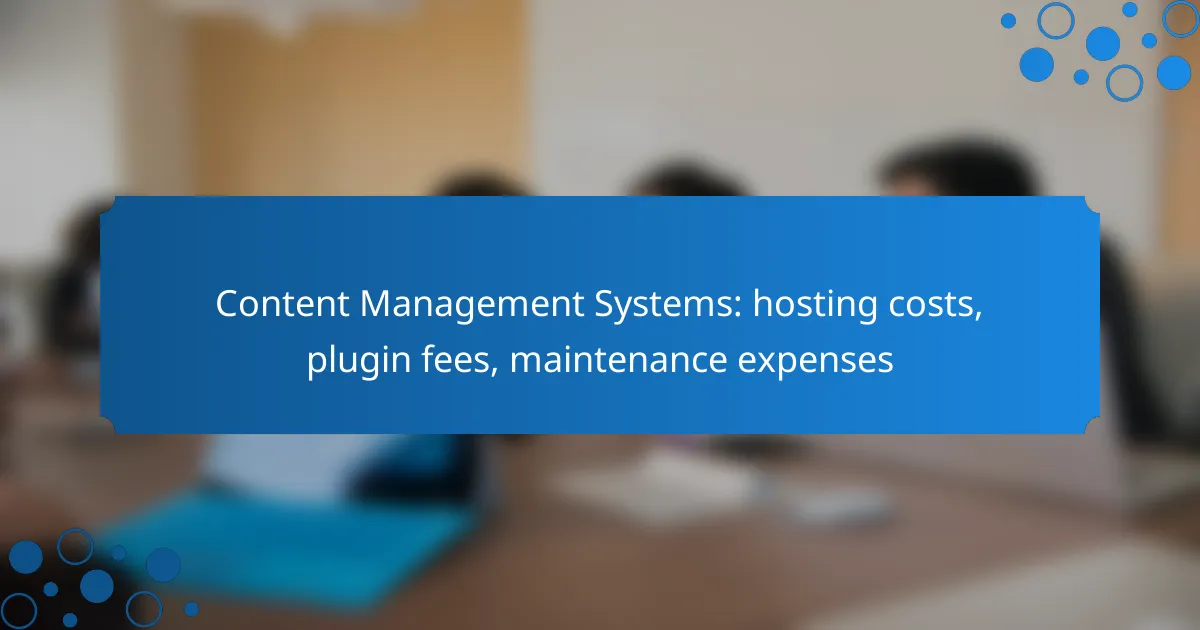Understanding the costs associated with Content Management Systems (CMS) is crucial for businesses looking to establish an online presence. Hosting costs in New Zealand can range from NZD 10 to NZD 200 per month, influenced by the chosen service type. Additionally, plugin fees can vary, offering both free and premium options, while maintenance expenses depend on the CMS’s complexity and required support, ensuring the system remains updated and secure.
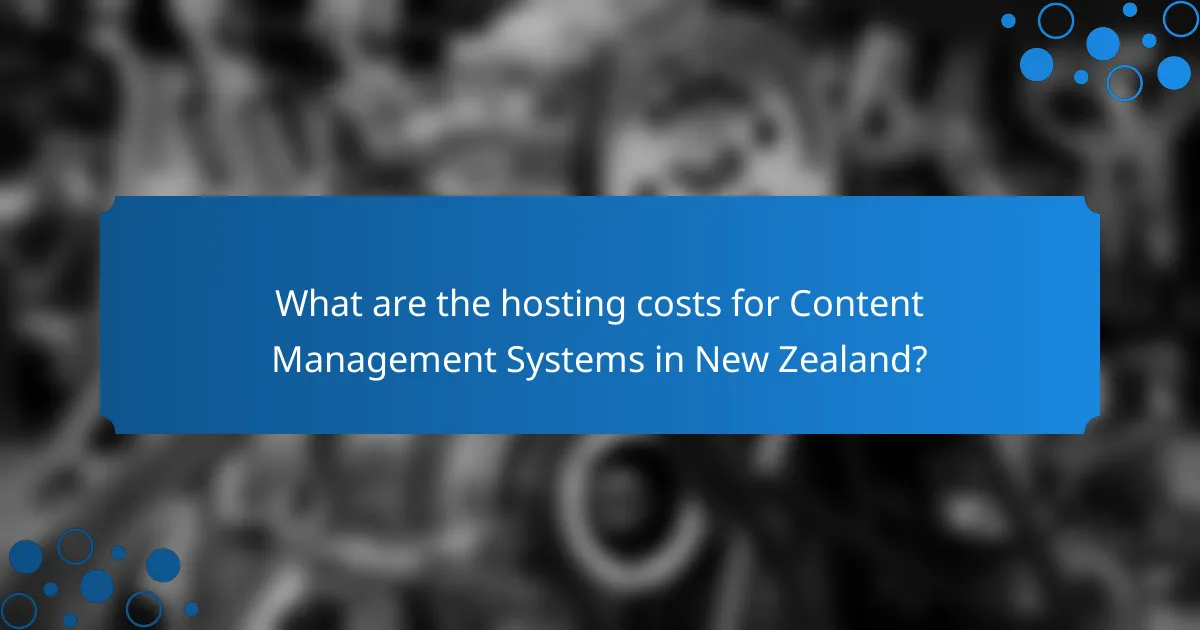
What are the hosting costs for Content Management Systems in New Zealand?
The hosting costs for Content Management Systems (CMS) in New Zealand can vary significantly based on the type of hosting service chosen. Generally, businesses can expect to pay anywhere from NZD 10 to NZD 200 per month, depending on their specific needs and the hosting provider selected.
Shared hosting options
Shared hosting is often the most economical choice for small websites and startups. Prices typically range from NZD 10 to NZD 30 per month, allowing multiple websites to share the same server resources. While this option is budget-friendly, it may lead to slower performance during peak traffic times.
When selecting a shared hosting plan, consider the storage space, bandwidth, and customer support offered. Popular providers in New Zealand include SiteHost and Crazy Domains, which offer competitive rates and features tailored for beginners.
Dedicated hosting options
Dedicated hosting provides an entire server for a single website, offering enhanced performance and security. This option usually costs between NZD 150 and NZD 500 per month, making it suitable for larger businesses with high traffic demands.
Choosing dedicated hosting means you have full control over server configurations and resources. However, it also requires more technical expertise for management and maintenance, so consider your team’s capabilities before committing.
Cloud hosting pricing
Cloud hosting is a flexible option that allows businesses to scale resources based on demand. Pricing for cloud hosting in New Zealand can range from NZD 20 to NZD 300 per month, depending on usage and the provider’s pricing model.
This type of hosting is ideal for websites with fluctuating traffic, as it can accommodate spikes without downtime. Major cloud providers like Amazon Web Services and Microsoft Azure offer robust solutions, but be sure to monitor costs closely to avoid unexpected charges.
Managed hosting services
Managed hosting services take care of server management, security, and updates, allowing businesses to focus on content rather than technical details. Prices typically range from NZD 50 to NZD 400 per month, depending on the level of service and resources provided.
This option is particularly beneficial for those who lack technical expertise or prefer to outsource IT responsibilities. Look for providers that offer strong customer support and tailored solutions to meet your specific CMS needs.
Cost comparison of popular providers
When comparing hosting providers in New Zealand, consider both the pricing and the features offered. Below is a simplified comparison of some popular options:
| Provider | Type | Starting Price (NZD/month) |
|---|---|---|
| SiteHost | Shared | 10 |
| Crazy Domains | Shared | 15 |
| Vodafone | Dedicated | 150 |
| Amazon Web Services | Cloud | 20 |
| WP Engine | Managed | 50 |
Evaluate these options based on your website’s needs, budget, and the level of support required to ensure you choose the best hosting solution for your CMS.
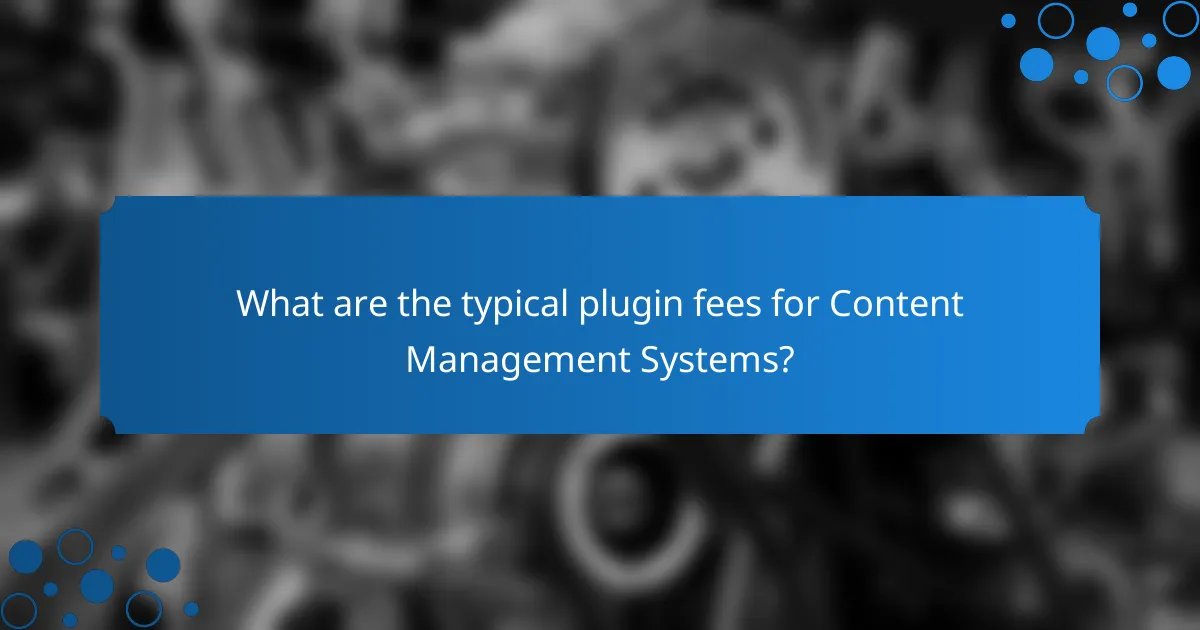
What are the typical plugin fees for Content Management Systems?
Plugin fees for Content Management Systems (CMS) can vary significantly based on the type and functionality of the plugins. Users can expect to encounter free options as well as premium plugins that may involve ongoing costs or one-time fees.
Free vs premium plugins
Free plugins are widely available and can cover basic functionality needs for many users. However, premium plugins often offer advanced features, better support, and regular updates, which can justify their costs.
When considering plugins, weigh the benefits of premium options against your specific requirements. Sometimes, investing in a premium plugin can save time and enhance site performance in the long run.
Monthly subscription costs
Some premium plugins operate on a subscription model, charging users monthly fees that can range from a few dollars to over twenty dollars per month. This model often includes ongoing updates and support, which can be beneficial for maintaining site security and functionality.
Before committing to a subscription, evaluate whether the features provided align with your needs and if the cost fits within your budget. Consider how long you plan to use the plugin to determine if a subscription is the best option.
One-time purchase fees
Many premium plugins are available for a one-time purchase fee, typically ranging from around $20 to several hundred dollars, depending on the complexity and features offered. This option can be appealing for those who prefer to avoid recurring costs.
When opting for a one-time fee, ensure that the plugin includes necessary updates and support for a reasonable period. Some developers may charge extra for ongoing support or major updates after the initial purchase.
Plugin bundles and discounts
Plugin bundles often provide a collection of related plugins at a discounted rate, which can be a cost-effective solution for users needing multiple functionalities. Discounts may also be available during promotional periods or for educational institutions.
Before purchasing a bundle, assess whether all included plugins are necessary for your site. This can help avoid spending on features you may not use, ensuring you get the best value for your investment.
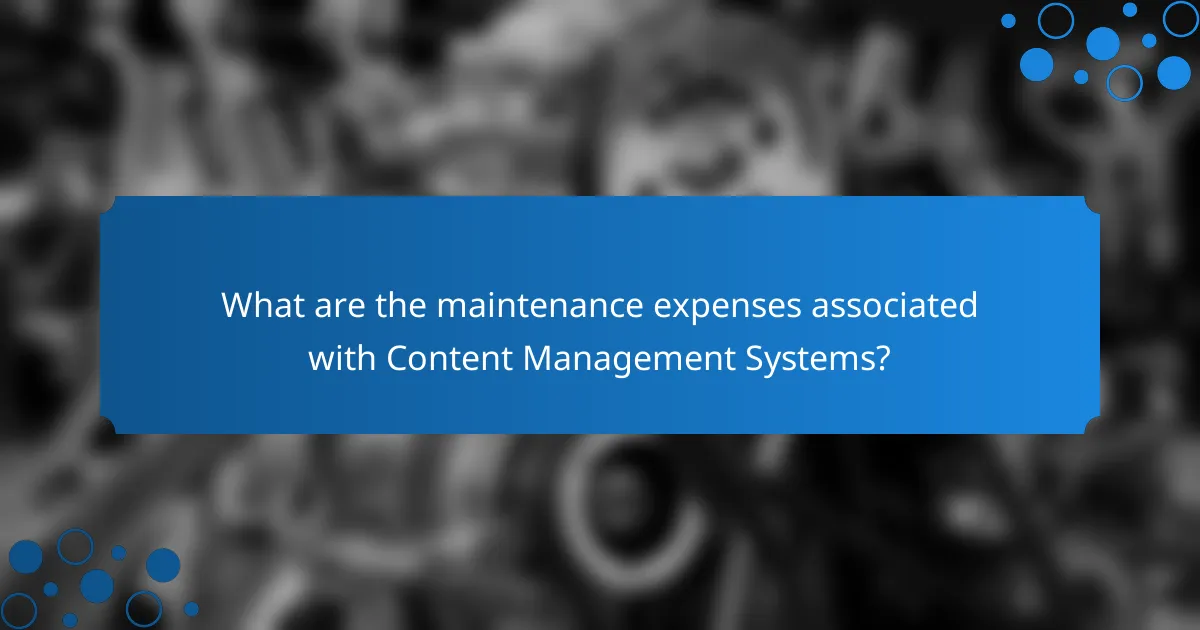
What are the maintenance expenses associated with Content Management Systems?
Maintenance expenses for Content Management Systems (CMS) include ongoing costs for keeping the system updated, secure, and functioning smoothly. These expenses can vary widely based on the complexity of the CMS, the level of support required, and the specific features in use.
Monthly maintenance packages
Many CMS providers offer monthly maintenance packages that cover essential services such as updates, backups, and security checks. These packages typically range from around $50 to several hundred dollars per month, depending on the level of service and the size of the website.
When choosing a maintenance package, consider the specific needs of your website. A small blog may require less frequent updates compared to a large e-commerce site, which may need more comprehensive support.
Cost of updates and backups
Regular updates and backups are crucial for the security and functionality of a CMS. While some platforms handle updates automatically, others may require manual intervention, which can incur additional costs. Backup solutions can range from free plugins to paid services costing $10 to $50 per month.
Evaluate whether your CMS includes built-in backup features or if you need to invest in third-party solutions. Regular backups are essential to prevent data loss, especially if your site handles sensitive information.
Technical support fees
Technical support fees can vary significantly based on the provider and the type of support needed. Some CMS platforms offer free community support, while others charge for premium support services, which can range from $20 to $150 per hour.
Consider the complexity of your CMS and your team’s technical expertise when budgeting for support. Investing in a reliable support plan can save time and reduce downtime in case of issues.
Security monitoring costs
Security monitoring is vital to protect your CMS from threats. Costs for security services can range from $10 to $100 per month, depending on the level of monitoring and response services included.
Look for security solutions that offer real-time monitoring, malware scanning, and vulnerability assessments. Regular security audits can help identify potential risks before they become serious problems.
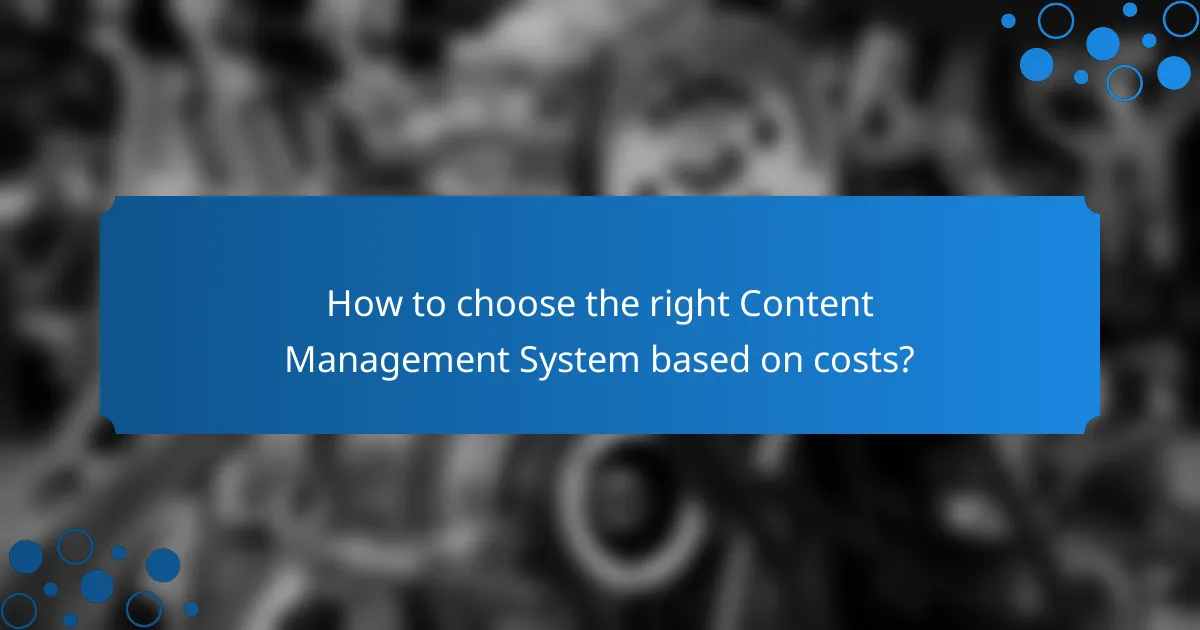
How to choose the right Content Management System based on costs?
Choosing the right Content Management System (CMS) involves evaluating various costs, including hosting, plugin fees, and maintenance expenses. Understanding these factors can help you select a CMS that fits your budget while meeting your needs.
Cost-benefit analysis
A cost-benefit analysis helps you weigh the financial implications of different CMS options against their features and functionalities. Start by listing all potential costs, including monthly hosting fees, plugin purchases, and ongoing maintenance expenses.
For example, a basic CMS might have low upfront costs but could require expensive plugins for essential features. In contrast, a more expensive CMS may include many built-in functionalities, reducing the need for additional purchases. Assessing these trade-offs can guide you toward a more cost-effective solution.
Feature comparison matrix
Creating a feature comparison matrix allows you to visualize the differences between various CMS platforms. List key features such as ease of use, customization options, and support services alongside their associated costs.
For instance, some CMS platforms may offer free plugins but charge higher hosting fees, while others might provide a comprehensive package at a higher initial cost but lower long-term expenses. This matrix will help you identify which CMS provides the best value for your specific requirements.
